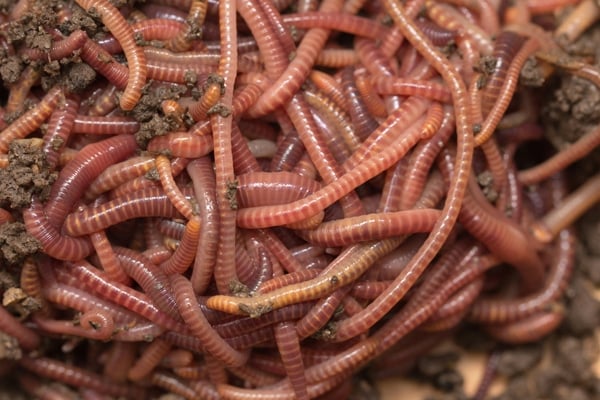Why Red Wigglers Are Important for Natural Farming
Red wigglers play a pivotal function in chemical-free farming, mainly through their distinct capability to decompose organic materials and boost soil health and wellness. Their activity not only enhances the soil with important nutrients yet additionally fosters a flourishing environment crucial for sustainable farming. Furthermore, the physical processes they involve in, such as aeration and wetness retention, contribute substantially to boosted plant returns. The level of their effect on agricultural methods and dirt biology raises intriguing questions regarding the future of organic farming. red wigglers. What implications might this have for farming approaches?
Duty of Red Wigglers in Soil Health

Furthermore, red wigglers improve soil structure by producing networks as they delve. These channels improve oygenation and water infiltration, advertising a much healthier origin setting. Their task additionally aids in maintaining optimal moisture degrees, which is essential for healthy and balanced plant development.

Benefits of Worm Spreadings
Worm castings, the nutrient-rich waste matter created by red wigglers, act as a powerful amendment for natural farming. These spreadings are brimming with essential nutrients such as nitrogen, phosphorus, and potassium, which are crucial for plant growth. Unlike artificial plant foods, worm castings release nutrients gradually, giving a constant supply gradually and minimizing the danger of nutrient leaching and overflow.
Additionally, worm spreadings boost dirt framework and oygenation, promoting healthier origin systems. Their high raw material material improves moisture retention, enabling plants to better hold up against dry spell conditions. Furthermore, worm spreadings contain helpful microorganisms that sustain plant health by subduing virus and boosting nutrition uptake.
The application of worm castings can cause enhanced crop yields and enhanced top quality of fruit and vegetables, making them an important resource for organic farmers. Their use likewise lines up with sustainable farming methods, adding to dirt fertility without the negative ecological influences associated with chemical plant foods. Overall, the consolidation of worm castings into farming techniques cultivates a more resistant and efficient ecosystem, underscoring the importance of red wigglers in chemical-free farming systems.

Enhancing Nutrient Biking
(purchase red worms)Nutrient cycling is an essential process in chemical-free farming, and the integration of red wigglers plays an essential duty in boosting this cycle. These earthworms add substantially to the malfunction of natural matter, facilitating the improvement of complex natural products right into simpler, more accessible nutrients for plants. As red wigglers eat decaying raw material, they excrete nutrient-rich castings, which are including beneficial microorganisms. This microbial task additional aids in the decomposition procedure, guaranteeing that crucial nutrients are readily available for plant uptake.
In addition, red wigglers aid to speed up the mineralization of nutrients, transforming them from inert forms right into bioavailable forms that plants can soak up. This process is critical for maintaining soil fertility and advertising healthy crop development. The visibility of red wigglers likewise urges a varied soil ecosystem, fostering a balance of nutrients that sustains various plant types.
Improving Dirt Framework
The improvement of soil structure is vital for promoting a healthy agricultural environment, and the task of red wigglers significantly contributes to this renovation. These earthworms play an essential duty in freshening the dirt and developing a network of channels that facilitate water seepage and origin penetration. As they tunnel with the soil, red wigglers break up compressed layers, permitting much better oxygen exchange and promoting microbial task.
Additionally, the raw material generated from their waste, recognized as vermicast, improves soil gathering. This process creates secure globs of dirt bits, boosting soil porosity and decreasing erosion (red wigglers). The existence of red wigglers also encourages the development of beneficial fungal networks, which are crucial for nutrient uptake by plants
Supporting Lasting Practices
Incorporating red wigglers into chemical-free farming methods not only boosts dirt health and wellness yet also advertises lasting farming techniques. These earthworms play a vital function in nutrient cycling, changing natural waste right into important compost that enriches the soil. By utilizing red wigglers, farmers can efficiently lower reliance on synthetic fertilizers, thus decreasing chemical overflow and its destructive impacts on communities.
Furthermore, the unification of red wigglers motivates the practice of reusing organic materials, such as kitchen area scraps and farm waste. This waste reduction technique not only lowers disposal costs however additionally cultivates a closed-loop system where nutrients are continually returned to the soil (red wigglers). Such techniques are crucial in mitigating climate change, as they enhance carbon sequestration and lower greenhouse gas discharges
Moreover, red wigglers boost water retention in the soil, which is critical in times of drought. Their burrowing activities produce networks that enable water to penetrate deeper right into the ground, therefore promoting reliable water usage. Ultimately, integrating red wigglers right into natural farming not only sustains biodiversity but likewise lines up with the concepts of sustainable farming, offering an all natural approach to food manufacturing.
Conclusion
Finally, great site red wigglers play a vital duty in chemical-free farming by considerably improving soil health and wellness and fertility. Their ability to break down organic matter and produce nutrient-rich spreadings fosters a successful microbial community, which is crucial for nutrient cycling. Furthermore, the burrowing tasks of these worms boost soil structure and aeration, facilitating much better water seepage and origin development. Thus, the integration of red wigglers into farming methods is crucial for advertising sustainability and improving overall dirt top quality.